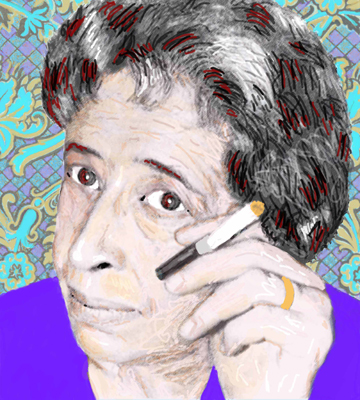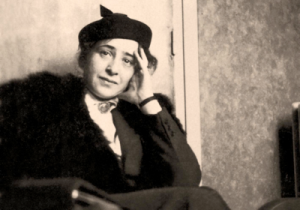The Consolation of Philosophy: Hannah Arendt and the Green Movement
1 Comment What does it mean to say that one needs to act? In The Human Condition Hannah Arendt insists that we should always distinguish “making” from “acting” when reflecting on the liberating potential of movements such as the Green Movement. Should people make the changes that they desire, or do they act to realize them?
What does it mean to say that one needs to act? In The Human Condition Hannah Arendt insists that we should always distinguish “making” from “acting” when reflecting on the liberating potential of movements such as the Green Movement. Should people make the changes that they desire, or do they act to realize them?
Connected to Arendt’s thought-trains on making and acting is also a separation of “violence” from “power.” What is the meaning of these concepts and what are the differences?
A concrete answer to these timeless questions has been offered by the Green Movement’s chanting, a source of inspiration for the world, and given the geopolitical role of Iran, a tremendously important experiment in democracy, not initiated by an outside force but by men and women themselves acting in concert. The Green Movement has emerged independently, although of course, Iran’s people are also inspired by Western values. Above all, we must humble ourselves before the courage and perseverance of the Iranian protesters. As friends we can request good deeds, as Ibn Sina once suggested, with kindness characterized by advice and not with violence characterized by pointing out disgrace (Isharat va Tanbihat, vol. 4, ninth class, Ch. 23). The Green Movement has many such friends who are with them in spirit. One of these is the political philosopher Hannah Arendt (1906-1975), a German-Jewish thinker who survived World War II and spent a lifetime thinking about action in the face of violence. Her work can be a source of inspiration, a beacon of light, for men and women living in dark times.
Presidential elections
It has almost been one year since the presidential elections. After millions of protestors poured into the streets, everything has changed and it does not seem likely that business will return to usual. For example: a new wave of exiled Iranians has emerged, predominantly in the form of students who are increasingly leaving Iran. One young filmmaker in New York said: “It is as if a bomb hit Iran, and threw us and scattered us all over the world.” But there is a great difference between this new wave of exiles and those of the past: thanks to increasing mobility, both physical and virtual, they are always standing firmly with one leg in Iran. Moreover, those entering the Western world usually interact with the many already existing Iranian communities and their strong professional ties to a variety of fields. Meanwhile inside Iran, protests continue in numerous forms. What advice and which admonitions could these very intelligent messengers offer their friends in Iran? Undoubtedly, many are waiting for that spark that can push the movement further towards emancipation. Thirst however, can and usually does also make human beings intolerant and vengeful. Thirst, when out of control, can make people forget to make the right distinctions. Here I want to mention two important distinctions offered by Hannah Arendt.
Making and Acting
As far back as the time of Plato’s Republic, the idea of making the perfect city has attracted political philosophers. The concept of making in Plato is connected to an idea or form that exists within the mind of a single human being, the wise man, who then orders things in the world so that they fit with the ideal in his mind. The metaphor can be easily understood when thinking about how an architect builds a house. The design already exists. All the architect needs to do is follow and implement it in reality and he will have the desired effect, namely a really existing house.
Plato dreamed of a time when either philosophers would become kings or kings philosophers, so that they could build the ideal city (Republic, book V). For Arendt, the great difference between a philosopher “king” and a religious leader however is that the true philosopher, Socrates, desires his subjects to think for themselves rather than to follow him. Socrates, who always insisted on his own ignorance and desire to speak with his fellow men and hear their opinions, could never have crowned himself. Plato’s philosopher king therefore is in practice a contradiction in terms (for Arendt on Socrates, see The Life of the Mind Vol.1, 1978).
The Platonic strategy to make the perfect city was expanded in modern history for making not just a city but powerful nations and even world history. It is a dangerous attempt to introduce a machine like perfection in the very strange and surprising world of men. Ayatollah Khomeini can be seen as one of the modern “makers” that Arendt warned us about, an architect who believed that he possessed the blueprint for the perfect state. The role he played was like a perverted version of the philosopher king, who because of his greater access to the realm of pure forms could give the right commands to make a harmoniously functioning nation.
The very troubling problem with the modern implementation of the idea of “making” our world as we think it should be, is that it has always been accompanied with violence. The intellectual supporters of the French Revolution believed in the “logic” that in order to make an omelet one has to break some eggs. Destruction, id est murder, is necessary to achieve historical progress and emancipation. The end, utopia or the kingdom of God on earth, justifies the means. Those who do not fit into the ideal that is to be made, must be eliminated for the sake of the end. When combined with another illusion, that of historical necessity, the idea that we “make” progress reaches its most dangerous level. Every time that history was “made,” for example by the Russians under Stalin’s command, it implied the destruction of the plurality of men for the sake of “unity” and “progress.” Not the kingdom of God, the communist paradise, but a kingdom of darkness was established, supported by a confederacy of deceivers who sought dominion over their fellow men (also see: Thomas Hobbes, Leviathan, Part IV).
The Human Condition
Arendt argues in The Human Condition that men, not Man, inhabit the earth and live in this world. This is the fact of plurality. If this fact is true, how can men act together without destroying or repressing their plurality? Arendt’s answer to this question lies in her understanding of what it means to act, which she very sharply distinguishes from making.
Action, as understood by Arendt, is intertwined with freedom and plurality. Freedom is the capacity to do something new, to act in an unexpected manner through the public expression of novel opinions. Because there are so many different opinions, action is only possible when accompanied by a sense of tolerance for others. It presupposes the recognition that rational people can disagree and yet live in peace with each other. But because action is so deeply intertwined with human freedom and plurality, we can never exactly know its outcomes. Action is therefore fundamentally different from mere behavior, which can be predicted and happens automatically. No one knows what the consequences of action will be, and no single actor has the ability to control the consequences of his or her deeds.
So far, the Green Movement’s style of resistance has been non violent and inclusive. Its supporters’ sudden and rapidly increasing diversity was and is very promising. But even so, such movements can and often do degenerate into more exclusive forms. Iranians do not necessary have to look at the history of other nations to understand this point. The 1979 revolution betrayed the plurality of people who were striving for more freedom and resulted in a brutal enforcement of one public identity, defined by a revolutionary religious discourse, for all citizens. “But woe to the legislator who wishes to establish through force a polity directed to ethical ends! For in so doing he would not merely achieve the very opposite of an ethical polity but also undermine his political state and make it insecure.” (Immanuel Kant, Religion within the bounds of reason, part IV, book 3). Should the Green Movement’s actions not degenerate into brutish nationalism, its supporters must consider the fact that there can be no true action without loving the principles of freedom and plurality.
A free Iran is a nation-state where “nation” does not refer to any kind of ethnicity or to a religion but to citizenship. A free Iran that respects the plurality of men protects the dignity of all ethnic minorities and all individuals, whether homosexual or heterosexual, Muslim or Atheist, man or woman, young or old. It is an Iran where citizens’ multiple identities can flourish through their actions, a place where they will be judged by “the content of their character” and not by their religion, language, sexuality, or any other easy category. Such an ideal is de facto far removed from everyday reality, but the extent to which it is respected determines the quality of the people’s acting in concert. Occasionally, the language employed by Iranians is disappointing, for example the discriminatory way that some talk about Arabs, Afghans and many other groups. But there are also hopeful signs, such as when solidarity is expressed with the Kurdish prisoners who were recently executed; or the reactions to a young male student being “ridiculed” by the authorities by publishing a picture of him wearing a veil: his male supporters protested against the arrest and simultaneously against the denigrating view of women by spreading pictures of themselves wearing the veil.
Violence and Power
Inevitably, Iranians will rightfully ask how action could be possible or endure in the face of so much organized violence? To answer this deep question, we turn to Arendt once again, but this time not seeking advice but a few comforting words. For those who are in prison today and their loved ones, Philosophy does not offer much but a sober consolation. In the thinking of Arendt, consolation can be found in the distinction that she makes between power and violence, already in The Human Condition (1958) and more elaborately in On Violence (1970).
Violence has always been essential to the survival of the Islamic Republic. Today, the killings of innocent citizens in the streets of Teheran have revealed this violence in its most immediately threatening, and directly perceptible, form. And today, we also know that the people of Iran are capable of peaceful protest and civil disobedience on a massive scale. The difference with the years before last year’s elections is not that these protestors and their sentiments did not exist, but that they too have become more directly perceptible, clashing with the violence that dominates their society. Their power is the opposite of the regime’s violence. The extreme form of power is the Green Movement against a dictator, all against one. The extreme form of violence is a dictator against a people, one against all. It is uncertain how exactly Iran is divided between these extremes and how many supporters the Green Movement has. However, there can be no hopeful future without all Iranians, whether they support or oppose the Green Movement today. The Green Movement’s silent march, mourning for those lost and promising a new beginning, is what Arendt calls power. Power is not owned by one or a few, but is by definition the property of a plurality of actors who are collectively holding hands. Power is not based on coercion, but on consent and informed thoughtful persuasion.
In the contemporary context, the Iranian regime can exert much more violence than the protestors. In a contest of violence against violence, the Green Movement would be doomed. Its only chance is a contest of state violence against the power of people acting in concert. Violence could still be effective and destroy the power generated by the Green Movement, but violence can never create the power that is necessary to legitimize good governance. Even if the Green Movement loses its momentum or its power, it should not drink from the cup of viciousness to satisfy the great thirst for freedom: violence can never be a real substitute for power.
What Arendt means with power is similar to what Martin Luther King Jr. described as soul force, in contradistinction to physical force, that is what Arendt calls violence. Let us hope that the spastic exercise of violence, the sign of the powerlessness of the Iranian regime, is caused by damage to its brain and spinal cord. And let us hope that our hope wins at the end. Power, like hope, is fragile. In the face of violence it can be defenseless. Perhaps expectations of a more democratic system will not be met soon, but nevertheless the dream will continue burning inside the hearts of millions, that one day all of us will hold hands together and repeat the words of the great defender of Civil Rights: “Free at last! Free at last! Thank God almighty! We are free at last!”
—
Also published at www.tehranreview.net
You May Also Like
Comments
One Response to “The Consolation of Philosophy: Hannah Arendt and the Green Movement”
Leave a Reply









May 21st, 2013 @ 11:17 am
Read more:
Anthony Court – Hannah Arendt’s Theory of Totalitarianism – Part One: http://rozenbergquarterly.com/?p=3099
Anthony Court – Hannah Arendt’s Theory of Totalitarianism – Part Two: http://rozenbergquarterly.com/?p=3115
Video: Interview Hannah Arendt – Zur Person: http://rozenbergquarterly.com/?p=5070